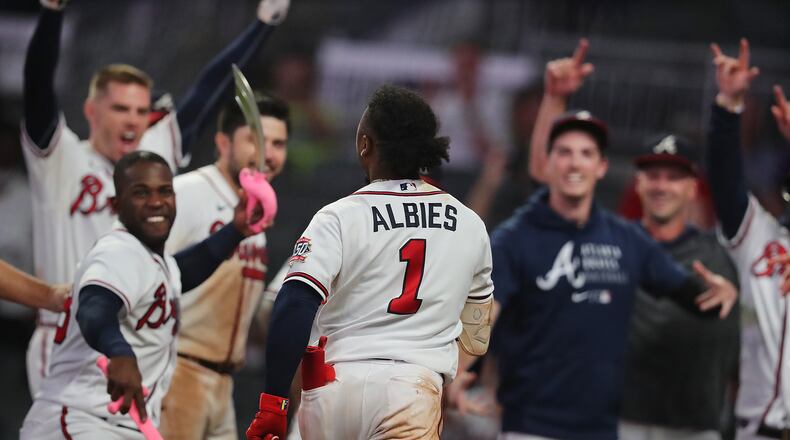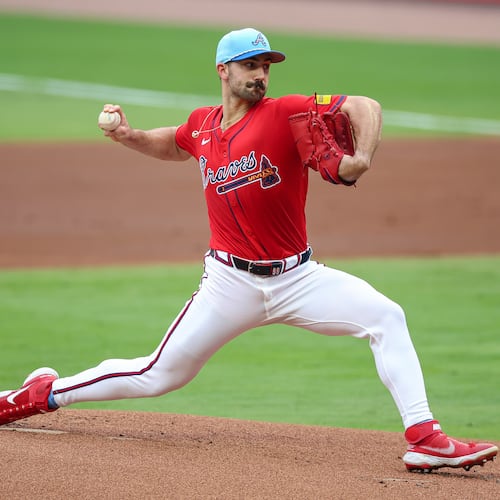WASHINGTON - In the original “Jurassic Park,” Ian Malcolm, played by Jeff Goldblum, muttered a famous warning about the park’s attempts to control its generated dinosaurs: “Life finds a way.”
A similar warning was issued to the inhabitants of the National League East, but they likewise didn’t listen. Now, the Braves, mired in injury, misfortune, gut-wrenching losses and inconsistency for the first 100 games, found a way.
After sitting idly for three hours during a rainy Friday night in Washington, the Braves defeated the Nationals 4-2. The Phillies and Mets suffered losses, shifting the Braves into a tie for first place for the second time in the past week. It didn’t seem conceivable for much of the year, and now it’s happened twice: the first-place Braves.
This doesn’t mean the team should celebrate anything, of course. There are still 46 Braves games remaining entering Saturday’s game, and the NL East will be a three-team race that comes down to the wire. But the Braves’ survival skills nonetheless deserve praise. A team many crossed off after superstar Ronald Acuna’s season-ending injury has risen from the ashes and put itself in position for a fourth consecutive division title.
“We’re relevant,” manager Brian Snitker said. “We’re playing meaningful games. Hopefully we continue to do that. I’ll take it. From where we were, where we started out and how we’ve been grinding through this thing, to be where we are in the season and right there, I’ll take it.”
However the season ends, that the Braves still matter in the waning days of the summer is a testament to the team’s culture and resilience. The Braves had endless excuses if they dropped off the map. Acuna, possibly the league MVP, was gone. Outfielder Marcell Ozuna was gone. Starter Mike Soroka never arrived.
Catcher Travis d’Arnaud missed 86 games, and his replacements were unsatisfactory. Young starting pitcher Ian Anderson has now missed a month. The bullpen has been maddening at times. The offense would post 20 runs one day and five combined over the next three games.
Sometimes it isn’t your year. It appeared that was the case with these Braves. But when many saw a dead end, general manager Alex Anthopoulos located a detour.
A season of inconsistencies had one constant: an underwhelming NL East. The division some pegged as perhaps baseball’s most competitive has turned out to be just that, though not because of its strength, but rather its flawed trio at the top.
Those circumstances led Anthopoulos to play several low-risk hands last month. He acquired outfielder Joc Pederson and catcher Stephen Vogt after the All-Star break, hoping to send a message to the clubhouse that the organization still believes in them following the Acuna injury.
Anthopoulos wasn’t done. He had the most active trade-deadline day in the division, adding outfielders Adam Duvall, Jorge Soler and Eddie Rosario, along with reliever Richard Rodriguez, on July 30. The Duvall move was particularly praised, since so many in the clubhouse already knew him from his past stint with the Braves.
Soler and Pederson have injected offense into a lineup that not too long ago was painfully thin. Rodriguez has been a breath of fresh air thus far in his Braves tenure, giving Snitker a weapon to deploy in any high-leverage spot.
Suddenly, the Braves were rejuvenated. After losing two of three in a hard-fought series against the Brewers, the Braves swept the Cardinals on the road. They came one out from sweeping the Nationals, settling for a series win. Then they took two of three from the Reds, and while the finale ended on a sour note, Bobby Cox’s two-of-three mantra applied.
They won the series opener in Washington on Friday, their eighth win in 10 games. They’re averaging 5.4 runs per game in that stretch.
“When you can make the pitcher work, make them make good pitches to get you out, it just shows the depth of this lineup,” shortstop Dansby Swanson said. “It gives us more opportunities to score runs in different ways, whether it’s from the walks or the plate discipline to get into better counts, those things. We’ve been doing a heck of a job the last couple weeks.”
The coming schedule might be the Braves’ grand opportunity. They began the trip with a win over what’s left of the Nationals. They’ll then travel to Miami and Baltimore, a chance to continue climbing further above .500.
“It’s been a challenging year,” Swanson said. “We have a big seven-week stretch ahead of us. We’ve just battled through, not just the adversity throughout the year, but some of the travel and late nights we’ve had. Even the rain delay and playing into the wee hours of the morning (Friday). … We put a good foot forward to start the road trip. It was nice for us to set the tone for these next eight games.”
While the Braves face teams with an eye toward their winter trip to Cabo, the Mets will endure a 13-game stretch against the Giants and Dodgers. If they can survive it – they’re already 0-1 – their schedule softens the rest of the way. Meanwhile, the Phillies – now 9-3 in their past 12 – are facing the Reds, Diamondbacks and Padres over the same stretch. That’s two postseason hopefuls and dreadful Arizona, whom the Braves will see four times next month.
The state of the NL East was exemplified the past few days. The Braves went from first place to third with one crushing loss. A day later, they were back tied for first. Smart money says such movement will continue over the next six weeks.
Ultimately, the Braves might not win the division. They’re playing with house money given the circumstances. But the fact that they matter in mid-August, all things considered, is a feat itself. How the team has overcome misfortune and competed through so many difficult days bodes well for the future. The franchise’s infrastructure is one conducive to long-term success.
But one immediate question remains: Will the 2021 season be remembered as the ultimate success story, in which the team secured a postseason berth despite the odds, or just a moral victory that the campaign wasn’t a total disappointment?
About the Author
Keep Reading
The Latest
Featured



